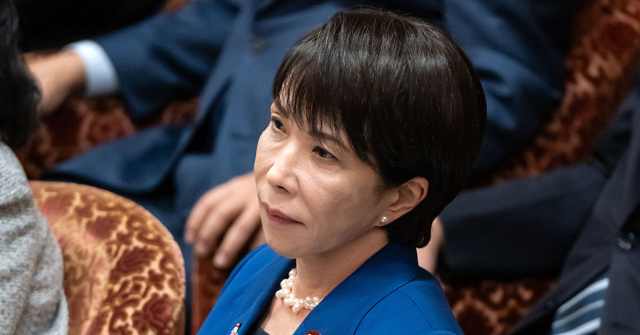China’s Ministry of Culture and Tourism issued a bulletin on Sunday to “solemnly remind” Chinese tourists they should avoid traveling to Japan for the foreseeable future, alleging that their safety cannot be guaranteed.
The bulletin urged Chinese visitors to Japan to “raise their safety awareness, strengthen self-protection, and promptly call police and contact Chinese embassies or consulates in emergencies.”
The bulletin followed a travel advisory from the Chinese Foreign Ministry on Friday warning of “unstable public security in Japan and multiple illegal and criminal incidents targeting Chinese nationals since the beginning of this year.”
“The atmosphere surrounding people-to-people exchanges has severely deteriorated, posing serious risks to the safety of Chinese citizens,” the foreign ministry said.
The travel warnings were part of China’s rapidly escalating diplomatic feud with Japanese Prime Minister Takaichi Sanae, who enraged Beijing ten days ago by telling the Japanese parliament that a potential Chinese invasion of Taiwan would be seen as a “situation threatening Japan’s survival.”
Japan has made no secret of its support for Taiwan, but previous prime ministers have avoided using the exact language Takaichi chose because “survival-threatening” situations can trigger a military response under Japan’s pacifist postwar constitution. The Chinese felt Takaichi was more explicit than previous prime ministers in saying that Japan would fight China to protect Taiwan.
Takaichi is also the first female prime minister of Japan and there was an unmistakable hint of misogyny in some Chinese responses as China’s belligerent militaristic “wolf warriors” flipped their lids over a Japanese woman daring to threaten them. One Chinese diplomat stationed in Japan went as far as threatening to cut Takaichi’s head off.
That diplomat, Xue Jian, still appeared to be at his post in Osaka on Monday — even after the Japanese government summoned his boss, Ambassador to Japan Wu Jianghao, to make a “strong protest regarding the highly inappropriate remarks.”
The Chinese Foreign Ministry’s travel advisory on Friday cited Takaichi’s “blatantly provocative remarks regarding Taiwan” as one reason why Chinese travelers should consider Japan unsafe for the moment. Japan is normally a popular destination for Chinese tourists and students.
The Beijing-controlled government of Hong Kong also issued a travel advisory for Japan, worded very similarly to the advisory from the Chinese Foreign Ministry.
Japanese Chief Cabinet Secretary Kihara Minoru criticized China’s travel advisories on Monday.
“An announcement that seems to shrink bilateral people-to-people exchanges is incompatible with the major direction confirmed between our leaders, such as promoting a strategic, mutually beneficial relationship and building a constructive and stable relationship,” Kihara said.
“We will closely monitor the situation, including the impact of the series of measures taken by the Chinese side, and respond appropriately,” he said.
Several Chinese travel agencies reportedly canceled all trips to Japan after the advisories were issued, saying they were uncertain travel to Japan would be possible before the beginning of the new year. China’s major airlines announced they would offer full refunds and free rescheduling for flights to Japan between November 15 and December 31.
The Chinese Ministry of Education on Sunday issued a warning that said, “Security in Japan has been unstable, with numerous cases of crimes against Chinese citizens.”
The bulletin did not expressly forbid Chinese students from studying in Japan, but told them to “pay close attention to the local security situation, strengthen risk assessment, and effectively enhance prevention awareness.”
China’s state-run Global Times on Sunday gleefully reported that China’s travel warnings have “sparked widespread attention and concern within Japanese society,” including fears that a shortage of Chinese tourists could have a significant impact on Japan’s tourism industry.”
The Global Times claimed “opposition to Takaichi’s remarks in the Diet is intensifying” and the “Japanese government is distressed” by China’s punishing response — which could escalate even further to denying Japan access to exports such as rare earth minerals.
“Takaichi should retract her erroneous remarks interfering in China’s internal affairs, apologize to the Chinese government, and resign as prime minister,” demanded Ryukoku University professor Matsushima Yasukatsu, approvingly quoted by the Global Times.
Matsushima pleased the Chinese Communist paper by hitting one of China’s current favorite talking points, namely that Takaichi’s “wrongful comments” reflect “the resurgence of historical revisionism in Japan.”
By “historical revisionism,” China means people in other countries who refuse to accept the Chinese Communist Party’s revised history of World War II, in which Chinese forces loyal to communism almost single-handedly defeated Imperial Japan and “liberated” the island of Formosa from Japanese control.
In reality, the Chinese forces who did most of the fighting against Japan were aligned with the Kuomintang and they were so weakened from the effort that the communists were able to seize control of China and drive them into exile. The Kuomintang settled on Formosa, which is now known as Taiwan.
Current Chinese Communist propaganda treats the Taiwanese government as illegitimate occupiers who are puppets of Japanese and Western imperialism, so invading Taiwan would essentially mean finishing the job of “liberating” or “repatriating” the island that began in World War II.
China has a long history of issuing overwrought “travel advisories” about countries it has political arguments with, including the United States during trade disputes in April, Australia during the Wuhan coronavirus pandemic, and South Korea in 2017 when it decided to deploy an advanced U.S. anti-missile system.
The Chinese Coast Guard on Sunday suddenly decided to conduct a “rights enforcement patrol” of the disputed Senkaku Islands, which both China and Japan claim.
The Taiwanese Defense Ministry monitored a surge of Chinese naval activity between Taiwan and the Senkaku island chain, combined with a “joint combat patrol” intended to “harass the airspace and sea” around Taiwan.

















